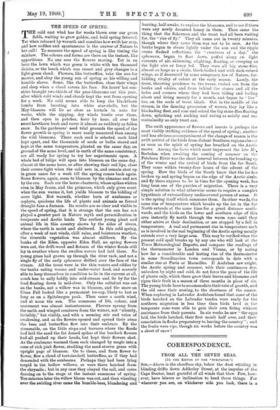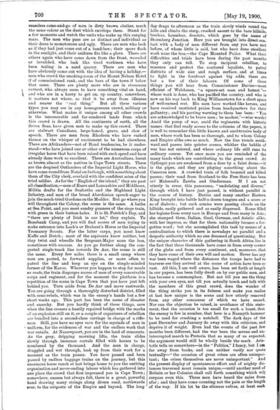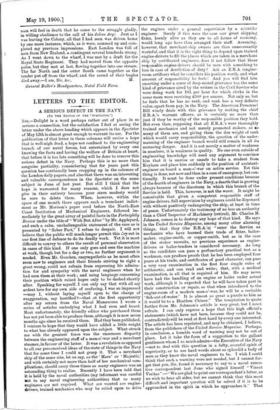CORRESPONDENCE.
FROM ALL THE SEVEN SEAS.
[TO THE EDITOR OP THE "SPECTATOR."]
Sra,—Above is the cloudless sky, below the dust whirling in blinding drifts down Adderley Street, at the impulse of the Cape Doctor, least grateful of all winds that blow. Few, how- ever, have leisure or inclination to heed these things. For wherever you are, on whichever side you look, there is, a
(aweless come-and•go of men in dirty -brown clothes, much the same colour as the dust which envelops them. Stand for a few momenta and watch the units who make up this surging mass. The men who pass are as distinct and individual as their dress is monotonous and ugly. There are men who look - as if they had just come out of a band-box; their spurs flash in the sunlight, and their uniform fits like a glove. There are others again who have come down from the front, wounded or invalided, who look like tired workmen who have been toiling in a sand quarry. There are men who have obviously come out with the idea of having a holiday,— men who crowd the smoking-room of the Mount Nelson Hotel if of commissioned rank, and the bars of the town if below that same. There are plenty more who are in strenuous earnest, who always seem to have something vital on hand, and who are in a hurry to get on, up country, somewhere, it matters not where, so that it be away from idleness and nearer the "real thing." But all these various types you may see in any homogeneous crowd, military or otherwise. What makes it unique among all other crowds is the innumerable and far-sundered lands from which this crowd is drawn. All the continents of earth, all the Seven Seas, have given men to make up this crowd. There are stalwart Canadians, large-boned, grave, and slow of speech. There are men from Rhodesia who have rushed thence on the whisper of excitement to be had elsewhere. There are Afrikanders—not of Bond tendencies, be it under- stood—who have joined one or other of the numerous corps of irregular horse that have been raised with such speed and have already done work so excellent. There are Australians, burnt as brown almost as the natives in Cape Town streets. There are the despised Outlanders of the Imperial Light Horse, who have come round from Natal on furlough, with something about them of the City clerk, overlaid with the confident mien of the tried soldier. As for the "English of the island," they are past all classification,—men of Essex and Lancashire and Middlesex, Militia drafts for the Seaforths and the Highland Light
• Infantry, and men of the broad Aberdonian speech eager to join the much-tried Gordons on the Modder. But go where you will throughout the Colony, the scene is the same. A bathe at Sea Point, and you meet sundry gunners of the siege train, with green in their button-holes. It is St. Patrick's Day, and "there are plenty of Irish in our lot," they explain. To Rosebank Camp, and you will find scores of men trying to make entrance into Loch's or Brabant's Horse or the Imperial Yeomanry Scouts. For the latter corps, you must know Kaffir and Dutch; most of the aspirants know neither, but they twist and wheedle the Sergeant-Major none the less, sometimes with success. As you go further along the con- gested single-track line towards De Aar, the scene is still the same. Every few miles there is a small camp where men are posted, to forward supplies, or more often to patrol the line and keep an eye on the simple-minded farmer of the Karoo. Wherever you happen to stop for meals en route, the train disgorges scores of men of every conceivable corps and regiment, and for the moment the platform is a repetition of the scene in Cape Town that you have just left behind you. Turn aside from De Aar and move eastwards. You are going through a thoroughly disturbed district, filled with semi-rebels, which was in the enemy's hands but a few short weeks ago. This part has been the scene of disaster and a nnrchy. But you hardly think of these things, save when the line crosses a hastily repaired bridge with the marks of an explosion still on it, or a couple of organisers of rebellion are bundled into a second-c],ass carriage in charge of a rifle- man. Still, you have no eyes save for the myriads of men in
• uniform, for the evidences of war and the endless work that war entails. At Naauwpoort, you are in the land of remounts. As the grey, dripping morning lifts, the train slides slowly through immense corrals filled with horses to be numbered by the thousand. And the men in charge, draggled and wet through, look up from their work for a moment as the train passes. You have passed and been passed by endless baggage trains on the journey, but this enormous horse ranch at last brings home to you the untiring organisation and never-ending labour which has gathered into one place the crowd that first impressed you in Cape Town ; somewhere, unseen but always felt, there is a great, powerful hand drawing many strings along divers road, northwards ever, to the outposts of the Empire and beyond,. The long
day drags to afternoon as the train slowly winds round the hills and climbs the steep, crooked ascent to the bare hillside, treeless, houseless, desolate, which goes by the name of Stormberg Junction. Here you are brought into direct con- tact with a body of men different from any you have met before, of whom little is said, but who have done excellent work none the less,—the Cape Mounted Police. What their difficulties and trials have been during the past months they only can tell. To stop incipient rebellion, to reassure and protect the scattered loyalists, to patrol districts of wide size and rough surface, and at times to fight in the forefront against big odds, these are but a few of their labours. Of some of these things you will hear from Commissioner Davies—most efficient of Welshmen, "a square-set man and honest "-- whose work is done, who has pacified the country, and who is now on his way back to King Williamstovrn for a short space of well-earned rest. His men have worked like heroes, and have received unstinted praise from headquarters for their gallantry; and his parting warning to them has been : "You are acknowledged to be brave men; be modest,"—wise words! Amid the pomp of war, amid the regiments with historic names that find ready access to the columns of the papers, it is well to remember this little known and unobtrusive body of men, whose work has been so thorough, and to whom' Colony and Empire alike owe so much. Now the line trends south- ward and passes into quieter scenes, whither the babble of war has not entered, and where ordinary life still runs its ordinary course. Yet once more you are reminded of the many lands which are contributing to the great crowd. At Gyfergat you are awakened from a doze by a faint drone,—it is the pipes, and they are playing something about the Cameron men. A crowded train of folk bronzed and kilted passes; their road from Scotland to the Free State has been via Mahn-ma's Zareba, and Omdurman. If I am not utterly in error, this panorama, "undulating and diverse," through which I have just passed, is without parallel in the course of history. Darius and many another Eastern King brought into battle half-a-dozen tongues and a score or so of dialects ; but such armies were passing clouds on the hillside, easily gathered and as easily dispersed. Rome filled her legions from every race in Europe and from many in Asia; she stamped them, Italian, Gaul, German, and Asiatic alike, with her impress, so that for them nationality became a for- gotten word ; but she accomplished this task by means of a centralisation to which there is nowadays no parallel and a despotic authority which no one dreamed of questioning. But the unique character of this gathering in South Africa lies in the fact that these thousands have come in from every corner of the globe and from every continent, and, moreover, that they have come of their own will and motion. Never has any war been waged where the distances the troops have had to traverse ere they arrived at the scene of action have been so vast. All this, I am well aware, has been set forth at length in our papers, has been fully dwelt on by our public men, and has become a commonplace. But not till you see the thing with your own eyes, not till you actually touch and talk with the members of this great crowd, does the wonder of the thing strike you in its fulness and make you realise at last how unique is the scene and how utterly removed from any other concourse of which we have record. Nor can the objection be raised, in avoidance of this state- ment, that the occasion is too small for such a boast, that the enemy is few in number, that here is a Nasmyth hammer to be used for crushing a nutshell. The dark days of the past December and January do away with this criticism, and deprive it of weight. Even had the events of the past few months been different, had the wax been the serene and un- interrupted march to Pretoria that so many of us expected, the argument would still be wholly beside the mark. Aris- totle tells us somewhere—in the "Politics," I fancy, but I am far away from books, and can neither verify nor quote textually—" the occasion of great crises are often unimpor- tant; the crises themselves are never unimportant." And the present display of spontaneous effort and of mighty dis- tances traversed must remain unique,—until another need of Britain or her Colonies shall call forth something which will surpass even this. These men have heard the noise from afar ; and they have come counting not the pain or the length of the way. If his lot be the alienum vulmu2, at least each man will feel. in death that he came to the struggle gladly, in willing obedience to the call of his dukes Argi. Just as I was leaving the Colony, all that I had seen was driven home by one more instance, which, as it were, summed up and com- pleted my previous impressions. East London was full of men from New Zealand, a contingent several hundreds strong. As I went down to the wharf, I was met by a draft for the Royal Scots Regiment. They had moved from the opposite poles, but they met at last, flowing together into one stream. The far North and the outer South came together as the tender put off from the wharf, and the sound of their bugles
General Buller's headquarters, Natal Field Force.








































 Previous page
Previous page